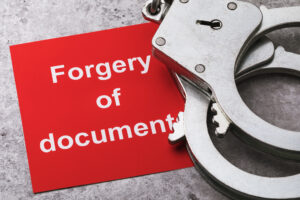Even though forgery is a non-violent offense, it still carries significant criminal penalties and collateral consequences. If you get convicted of forgery, jail time is a serious possibility. A forgery conviction can also impact your ability to secure future employment, especially in industries like finance or banking, where honesty and integrity are necessary traits.
State and federal prosecutors dedicate extensive resources to forgery investigations, leaving the accused at a severe disadvantage. A knowledgeable forgery lawyer can level the playing field by preparing a strategy to defend your rights. Contact an attorney at Smith & Holder, PLLC, to schedule an appointment.
What Is Forgery?
In Mississippi, a person commits credit card forgery when they falsely make, alter, or emboss a card purporting to be a credit card with intent to defraud a purported cardholder, issuer, or person or organization providing money, goods, property, services, or anything else of value.
An example of credit card forgery is when an individual creates a fake credit card and uses it to pay for something of value.
Mississippi outlines different types of forgery based on the document or information falsely represented.
For example, an individual who makes a false entry or falsely alters any entry made in any book of accounts kept in the office of the auditor of public accounts, the office of the treasurer of this state, the office of any county treasurer, or any other public office, by which any demand or obligation, claim, right, or interest, either against or in favor of the state, any county, city, town, village, or individual commits forgery. Forgery also occurs if someone makes a false entry or falsely alters account books kept by for-profit corporations.
Erasing, obliterating, or destroying a writing instrument that creates, increases, discharges, diminishes, or in any way affects any financial obligation, right, interest, or claim to property is also forgery.
The prosecutor must always prove the accused intended to defraud the victim.
You Have the Right to a Fair Defense — Contact Us
Sidebar Form
Federal Forgery Charges and Penalties
Federal law describes forgery as making, altering, using, or possessing a false document or material with the intent of committing fraud. It also outlines penalties for individuals who fraudulently make, forge, counterfeit, or alter any security of the United States.
A federal forgery conviction is punishable by up to 20 years in prison. The presiding judge uses the U.S. Sentencing Guidelines to help them determine an appropriate sentence. They will consider factors about the accused to make the determination, such as:
- The history and character of the accused;
- Effect of incarceration on their dependents; and
- They need to pay restitution.
The judge will also evaluate the sentences of similarly charged defendants to avoid unwarranted sentencing disparities.
Is Forgery a Felony?
Credit card forgery is a misdemeanor punishable by up to one year in jail and a fine of up to $1,000.
For other forgery charges, the penalties depend on the amount of value at issue. If the value involved is less than $1,000, the forgery is a misdemeanor punishable by up to six months in jail and a fine of up to $1,000. If the value involved is more than $1,000 but less than $5,000, the forgery is a felony and is punishable by up to five years in prison and a fine of up to $10,000. If the value involved is more than $5,000 and less than $25,000, it is punishable by up to 10 years in prison and a fine of up to $10,000. If the value involved is more than $25,000, the forgery is punishable by up to 20 years in prison and a fine of up to $10,000.
How to Get Out of Forgery Charges

To get out of forgery charges, it’s essential to challenge the prosecution’s case and create doubt about your guilt. Here are some effective defenses that an experienced forgery attorney might use:
- Lack of Intent to Defraud: Demonstrate that there was no intention to deceive or cause harm.
- Consent: Prove that you had permission to sign or alter the document in question.
- Authenticity: Show that the signature or instrument is genuine and not forged.
- Coercion: Argue that you were forced to forge the document under threat or duress.
An experienced fraud attorney can review your case and determine the most applicable defense strategy.
Contact a Forgery Attorney at Smith & Holder, PLLC, to Discuss Your Case
An embezzlement lawyer at Smith & Holder, PLLC, can help whether you are facing charges in state or federal court. An experienced lawyer can help your case by:
- Negotiating with the prosecutor to secure a positive result;
- Requesting copies of relevant police reports;
- Preparing witnesses for cross-examination by the prosecutor;
- Determining whether a legal defense applies to your case;
- Explaining your charges and
- Preparing your case for trial, if necessary.
Our founding attorney, Chris Smith, has experience as a prosecutor, giving him extensive courtroom expertise and insight into how the state proves its case. Contact a lawyer with Smith & Holder, PLLC, to discuss the facts of your forgery case.

